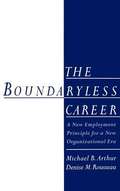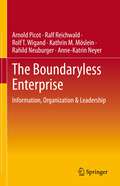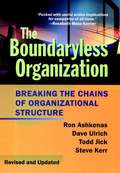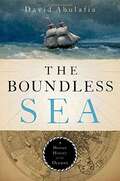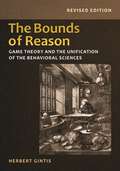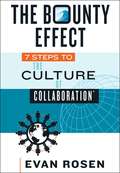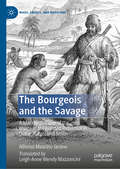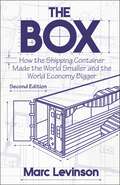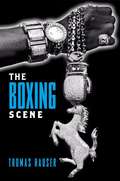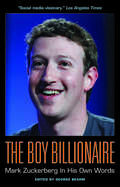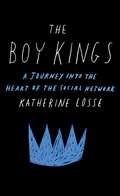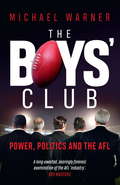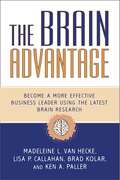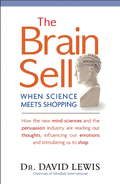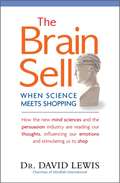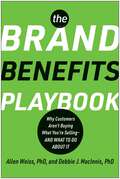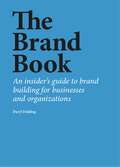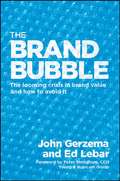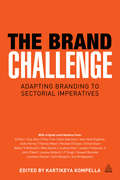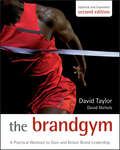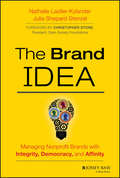- Table View
- List View
The Boundaryless Career: A New Employment Principle For A New Organizational Era
by Michael B. Arthur Denise M. RousseauThis text explores the ways in which people's work careers are changing as the organizations in which they work are changing. The old concept of the firm as a self contained entity interacting mainly with its customers has been replaced by the reality of firms whose boundaries have given way to new alliances with suppliers, sometimes competitors, and other outside organizations, in ways that require a redefinition of what a firm can expect from lifetime employment. At the same time, the workers in these careers are interrupted by layoffs, or changed by new technologies, and over their work life will be expected to maintain a habit of continuous learning to remain in the work force.
The Boundaryless Enterprise: Information, Organization & Leadership
by Anne-Katrin Neyer Arnold Picot Rahild Neuburger Ralf Reichwald Kathrin M. Möslein Rolf T. Wigand" ... Hier wird ein theoriegeleitetes und dennoch spannendes Lehrbuch vorgelegt, das das Veränderungspotential der Informations- und Kommunikationstechnik für die Struktur und für das Management der Unternehmen umfassend darlegt. In hohem Maße auch für Praktiker lesenswert..." Frankfurter Allgemeine Zeitung Die 5. Aufl. wurde aktualisiert. Insbesondere wurden die zahlreichen Praxisbeispiele in allen Kapiteln überarbeitet.
The Boundaryless Organization
by Dave Ulrich Ron Ashkenas Steve Kerr Todd JickIn 1995 The Boundaryless Organization showed companies how to sweep away the artificial obstacles-such as hierarchy, turf, and geography-that get in the way of outstanding business performance. Now, in this completely revised edition of their groundbreaking work, management experts Ron Ashkenas, Dave Ulrich, Todd Jick, and Steve Kerr offer an up-to-date version of their comprehensive guide to help any organization go "boundaryless"-and become a company with the ability to quickly, proactively, and creatively adjust to changes in the environment. With new examples, a new commentary on the developments of the last five years, and illuminating first-hand accounts from pioneering senior executives, the authors once again show why "boundaryless" is a prerequisite for any organization trying to succeed in the economy of the twenty-first century.
The Boundless Sea: A Human History Of The Oceans
by David AbulafiaFrom the beginning of history to the present, a sweep of the world's oceans and seas and how they have shaped the course of civilization. From the author of the acclaimed The Great Sea, ("Magnificent . . . radiates scholarship and a sense of wonder and fun," Simon Sebag Montefiore; Book of the Year, The Economist), David Abulafia's new book guides readers along the world's greatest bodies of water to reveal their primary role in human history. The main protagonists are the three major oceans--the Atlantic, the Pacific, and the Indian--which together comprise the majority of the earth's water and cover over half of its surface. Over time, as passage through them gradually extended and expanded, linking first islands and then continents, maritime networks developed, evolving from local exploration to lines of regional communication and commerce and eventually to major arteries. These waterways carried goods, plants, livestock, and of course people--free and enslaved--across vast expanses, transforming and ultimately linking irrevocably the economies and cultures of Africa, Europe, Asia, and the Americas. Far more than merely another history of exploration, The Boundless Sea shows how maritime networks gradually formed a continuum of interaction and interconnection. Working chronologically, Abulafia moves from the earliest forays of peoples taking hand-hewn canoes into uncharted waters, to the routes taken daily by supertankers in the thousands. History on the grandest scale and scope, written with passion and precision, this is a project few could have undertaken. Abulafia, whom The Atlantic calls "superb writer with a gift for lucid compression and an eye for the telling detail," proves again why he ranks as one of the world's greatest storytellers.
The Bounds of Reason: Game Theory and the Unification of the Behavioral Sciences - Revised Edition
by Herbert GintisGame theory is central to understanding human behavior and relevant to all of the behavioral sciences—from biology and economics, to anthropology and political science. However, as The Bounds of Reason demonstrates, game theory alone cannot fully explain human behavior and should instead complement other key concepts championed by the behavioral disciplines. Herbert Gintis shows that just as game theory without broader social theory is merely technical bravado, so social theory without game theory is a handicapped enterprise. This edition has been thoroughly revised and updated.Reinvigorating game theory, The Bounds of Reason offers innovative thinking for the behavioral sciences.
The Bounty Effect: 7 Steps To The Culture Of Collaboration
by Evan RosenThe Bounty Effect: 7 Steps to The Culture of Collaboration® is a much-anticipated sequel to Evan Rosen's The Culture of Collaboration®, Gold Medal Winner in the Axiom Business Book Awards. The Bounty Effect happens when exigent circumstances compel businesses, governments and organizations to change from command-and-control to collaborative. Triggers include disruptive market forces, new competitors, regional slowdowns, natural disasters, terrorist attacks and global downturns. Seize the opportunity The Bounty Effect provides. Learn how to change any organization so that every worker is a knowledge worker and each team member produces results collaboratively. See why organizations have been traveling down a well-worn road, because the new highway has yet to be built until now.
The Bourgeois Virtues: Ethics for an Age of Commerce
by Deirdre NansenFor a century and a half, the artists and intellectuals of Europe have scorned the bourgeoisie. And for a millennium and a half, the philosophers and theologians of Europe have scorned the marketplace. The bourgeois life, capitalism, Mencken’s “booboisie” and David Brooks’s “bobos”—all have been, and still are, framed as being responsible for everything from financial to moral poverty, world wars, and spiritual desuetude. Countering these centuries of assumptions and unexamined thinking is Deirdre McCloskey’s The Bourgeois Virtues, a magnum opus that offers a radical view: capitalism is good for us. McCloskey’s sweeping, charming, and even humorous survey of ethical thought and economic realities—from Plato to Barbara Ehrenreich—overturns every assumption we have about being bourgeois. Can you be virtuous and bourgeois? Do markets improve ethics? Has capitalism made us better as well as richer? Yes, yes, and yes, argues McCloskey, who takes on centuries of capitalism’s critics with her erudition and sheer scope of knowledge. Applying a new tradition of “virtue ethics” to our lives in modern economies, she affirms American capitalism without ignoring its faults and celebrates the bourgeois lives we actually live, without supposing that they must be lives without ethical foundations.High Noon, Kant, Bill Murray, the modern novel, van Gogh, and of course economics and the economy all come into play in a book that can only be described as a monumental project and a life’s work. The Bourgeois Virtues is nothing less than a dazzling reinterpretation of Western intellectual history, a dead-serious reply to the critics of capitalism—and a surprising page-turner.
The Bourgeois and the Savage: A Marxian Critique of the Image of the Isolated Individual in Defoe, Turgot and Smith (Marx, Engels, and Marxisms)
by Alfonso Maurizio IaconoThis classic text in Italian history of political philosophy, translated into English for the first time, investigates the philosophical and ideological conceptions hidden beneath the modern image of the isolated individual. In The Bourgeois and the Savage, Alfonso Maurizio Iacono reveals that this apparently simple and transparent image is imbued with a profound complexity containing human and social relationships, which are intertwined with relationships of power, domination, inequality, colonisation and servitude. As Karl Marx argued, and as was later confirmed by twentieth-century anthropology, the isolated individual does not stand at the beginning of history; he can emerge only where social relationships are already very developed and where society appears as a tool used for private purposes. Considering the writings of Daniel Defoe, the great French Enlightenment philosopher Turgot, and the father of political economy Adam Smith, The Bourgeois and the Savage critically analyses the process which led to the naturalisation of the image of the isolated man and traces its development and transformation into a still dominant paradigm.
The Box: How the Shipping Container Made the World Smaller and the World Economy Bigger - Second Edition with a new chapter by the author
by Marc LevinsonIn April 1956, a refitted oil tanker carried fifty-eight shipping containers from Newark to Houston. From that modest beginning, container shipping developed into a huge industry that made the boom in global trade possible. The Box tells the dramatic story of the container's creation, the decade of struggle before it was widely adopted, and the sweeping economic consequences of the sharp fall in transportation costs that containerization brought about. But the container didn't just happen. Its adoption required huge sums of money, both from private investors and from ports that aspired to be on the leading edge of a new technology. It required years of high-stakes bargaining with two of the titans of organized labor, Harry Bridges and Teddy Gleason, as well as delicate negotiations on standards that made it possible for almost any container to travel on any truck or train or ship. Ultimately, it took McLean's success in supplying U.S. forces in Vietnam to persuade the world of the container's potential. Drawing on previously neglected sources, economist Marc Levinson shows how the container transformed economic geography, devastating traditional ports such as New York and London and fueling the growth of previously obscure ones, such as Oakland. By making shipping so cheap that industry could locate factories far from its customers, the container paved the way for Asia to become the world's workshop and brought consumers a previously unimaginable variety of low-cost products from around the globe. Published in hardcover on the fiftieth anniversary of the first container voyage, this is the first comprehensive history of the shipping container. Now with a new chapter, The Box tells the dramatic story of how the drive and imagination of an iconoclastic entrepreneur turned containerization from an impractical idea into a phenomenon that transformed economic geography, slashed transportation costs, and made the boom in global trade possible.
The Boxing Scene
by Thomas HauserThe Boxing Scene, Hauser's "provocative new anthology," contains all of his trademark insights and candor as he peels away layers of hypocrisy to reveal the men who make up the contemporary boxing landscape. Hauser exposes the inner workings of HBO Sports; examines the phenomenon of mixed martial arts as it relates to boxing; and records the amusing encounter between his 81-year-old mother and larger-than-life boxing impresario Don King. "The Boxing Scene" also updates Hauser's personal and professional thoughts on superstars like Oscar De La Hoya, Floyd Mayweather Jr., Ricky Hatton, Miguel Cotto, and Bernard Hopkins as well as fight promoter Bob Arum, announcer Bob Sheridan and a host of others.
The Boy Billionaire: Mark Zuckerberg In His Own Words
by George BeahmMark Zuckerberg, the youngest Person of the Year named by Time magazine since Charles Lindbergh in 1927, has grown in prominence as rapidly as the company he founded in a Harvard dorm room in 2004. The public's appetite for insight into Facebook and its founder seems nearly insatiable. Curiosity abounds regarding Zuckerberg's personality and management style, since fictional Hollywood portrayals and Wall Street whispers have painted a broad-strokes portrait of the young CEO that is at best only a fraction of the truth.Given Facebook's current $58 billion market capitalization and 845 million worldwide users, there is clearly more to Zuckerberg than any over-simplified caricature could convey. The Boy Billionaire: Mark Zuckerberg In His Own Words is the first and only book to detail the visionary thoughts and opinions of Facebook's founder entirely through direct quotations from Zuckerberg himself. It is the most intimate and most authoritative look at the man behind Facebook's once-a-generation success, the tech heir-apparent to Steve Jobs and Bill Gates.Like those two pioneering entrepreneurs, Zuckerberg has proven to be a calculating and sometimes ruthless strategist with a steadfast commitment to his vision. Facebook exists somewhere between a social utility and a model of 21st century business, leading next-gen tech companies through an economic climate still scarred by the dot-com bubble of the early 2000s, but increasingly driven by the inevitability of a global marketplace built on social media technology.Facebook's potential is unknown, but the key to its success depends on Zuckerberg's own ideas and vision. This book serves up his most thought-provoking insights, as researched and chosen by George Beahm, the New York Times bestselling editor of I, Steve: Steve Jobs In His Own Words. The Boy Billionaire: Mark Zuckerberg In His Own Words provides crucial illumination of Zuckerberg and the company he's created, emphasizing insights, business strategies, and lessons learned. It is essential reading for people who seek innovative solutions applicable to their business, regardless of size, and makes an ideal gift or reference item for anyone interested in this newest of American business icon.
The Boy Kings
by Katherine LosseKate Losse was a grad school refugee when she joined Facebook as employee #51 in 2005. Hired to answer user questions such as "What is a poke?" and "Why can't I access my ex-girlfriend's profile?" her early days at the company were characterized by a sense of camaraderie, promise, and ambition: Here was a group of scrappy young upstarts on a mission to rock Silicon Valley and change the world. Over time, this sense of mission became so intense that working for Facebook felt like more than just a job; it implied a wholehearted dedication to "the cause." Employees were incentivized to live within one mile of the office, summers were spent carousing at the company pool house, and female employees were told to wear T-shirts with founder Mark Zuckerberg's profile picture on his birthday. Losse started to wonder what this new medium meant for real-life relationships: Would Facebook improve our social interactions? Or would we all just adapt our behavior to the habits and rules of these brilliant but socially awkward Internet savants who have become today's youngest power players? Increasingly skeptical, Losse graduated from customer service to the internationalization team--tasked with rolling out Facebook to the rest of the world-- finally landing a seat right outside Zuckerberg's office as his personal ghostwriter, the voice of the boy king. This book takes us for the first time into the heart of this fast-growing information empire, inviting us to high-level meetings with Zuckerberg; lifting the veil on long nights of relentless hacking and trolling; taking us behind the scenes of raucous company parties; and introducing us to the personalities, values, and secret ambitions of the floppy-haired boy wonders who are redefining the way we live, love, and work. By revealing here what's really driving both the business and the culture of the social network, Losse answers the biggest question of all: What kind of world is Facebook trying to build, and is it the world we want to live in? *** "Logging on to Facebook that first day, in retrospect, was the second, and to date the last, time that any technology has captured my imagination. The first was when Apple advertised the first laptop, the PowerBook, in the 1990s--with the words, 'What's on your PowerBook?' "'World domination,' my teenaged self- answered instinctively. That's what these devices were made for, I thought: so small and yet so powerful, so capable of linking quickly to and between everything else in the world. From the laptop, I could write and distribute information faster than ever before. It was intoxicating to imagine, and Facebook's sudden, faithful rendering in 2004 of the physical world into the virtual felt the same. What could you do, now that you could see and connect to everyone and everything, instantly? "But what, also, could be diminished by such quick access? In the realm of ideas, it seemed easy: Who wouldn't want to distribute and discuss ideas widely? However, in the realm of the personal, it seemed more complicated. What was the benefit of doing everything in public? Is information itself neutral, or do different types of information have different values, different levels of expectation of privacy, different implications for distribution and consumption? Should all information be shared equally quickly and without regard to my relationship to it? And, finally, and most important, as we ask whenever we begin a new relationship with anything, would this be good for me?" -- From the Introduction
The Boy Kings: A Journey into the Heart of the Social Network
by Katherine LosseKate Losse was a grad school refugee when she joined Facebook as employee #51 in 2005. Hired to answer user questions such as "What is a poke?" and "Why can't I access my ex-girlfriend's profile?" her early days at the company were characterized by a sense of camaraderie, promise, and ambition: Here was a group of scrappy young upstarts on a mission to rock Silicon Valley and change the world. Over time, this sense of mission became so intense that working for Facebook felt like more than just a job; it implied a wholehearted dedication to "the cause." Employees were incentivized to live within one mile of the office, summers were spent carousing at the company pool house, and female employees were told to wear T-shirts with founder Mark Zuckerberg's profile picture on his birthday. Losse started to wonder what this new medium meant for real-life relationships: Would Facebook improve our social interactions? Or would we all just adapt our behavior to the habits and rules of these brilliant but socially awkward Internet savants who have become today's youngest power players? Increasingly skeptical, Losse graduated from customer service to the internationalization team--tasked with rolling out Facebook to the rest of the world-- finally landing a seat right outside Zuckerberg's office as his personal ghostwriter, the voice of the boy king. This book takes us for the first time into the heart of this fast-growing information empire, inviting us to high-level meetings with Zuckerberg; lifting the veil on long nights of relentless hacking and trolling; taking us behind the scenes of raucous company parties; and introducing us to the personalities, values, and secret ambitions of the floppy-haired boy wonders who are redefining the way we live, love, and work. By revealing here what's really driving both the business and the culture of the social network, Losse answers the biggest question of all: What kind of world is Facebook trying to build, and is it the world we want to live in? *** "Logging on to Facebook that first day, in retrospect, was the second, and to date the last, time that any technology has captured my imagination. The first was when Apple advertised the first laptop, the PowerBook, in the 1990s--with the words, 'What's on your PowerBook?' "'World domination,' my teenaged self- answered instinctively. That's what these devices were made for, I thought: so small and yet so powerful, so capable of linking quickly to and between everything else in the world. From the laptop, I could write and distribute information faster than ever before. It was intoxicating to imagine, and Facebook's sudden, faithful rendering in 2004 of the physical world into the virtual felt the same. What could you do, now that you could see and connect to everyone and everything, instantly? "But what, also, could be diminished by such quick access? In the realm of ideas, it seemed easy: Who wouldn't want to distribute and discuss ideas widely? However, in the realm of the personal, it seemed more complicated. What was the benefit of doing everything in public? Is information itself neutral, or do different types of information have different values, different levels of expectation of privacy, different implications for distribution and consumption? Should all information be shared equally quickly and without regard to my relationship to it? And, finally, and most important, as we ask whenever we begin a new relationship with anything, would this be good for me?" -- From the Introduction
The Boys' Club
by Michael WarnerThe Boys' Club is the must-read inside story behind the power and politics of AFL, Australia's biggest sport.Revealing how the fledgling state administrative body evolved into the Australian Football League and its meteoric rise to become one of the richest and most powerful organisations in the land, award-winning investigative journalist Mick Warner delivers a fascinating insight into key figures and their networks.Tracking the rise of the game and the AFL figureheads, The Boys' Club lifts the lid on the scandals, secrets and deal making that have shaped the Australian game.
The Brain Advantage: Become a More Effective Leader Using the Latest Brain Research
by Madeleine L. Van Hecke Lisa P. Callahan Brad Kolar Ken A. PallerThe Brain Advantage shows leaders how to become even more effective decision-makers, communicators, and change-agents. It gives you an executive summary of the latest brain research and its implications for your leadership style and practices.
The Brain Sell
by David LewisIn a room sat a theoretical physicist, an engineer, a mathematician, a biochemist, and a neuropsychologist. Their task? To evaluate the effectiveness of a marketing campaign for a grooming product that retails for less than $15.00.The Brain Sell, praised as the new Hidden Persuaders, is the inside story of how our rapidly evolving understanding of the brain plays into the advertising, marketing, and retailing industry. With the emergence of Big Data mining, the "persuasion industry" is more prominent than ever. David Lewis, PhD, internationally renowned researcher, brings science to shopping-mapping the brain and the body to explore the sensitivities in our minds and discover how we select and buy. Gone are the days of traditional salesmanship-in the United Kingdom and United States alone, $313 billion is spent annually on subliminal messaging and measuring consumers' subconscious reactions to the color of a child's toy, the smell of a store's interior, or the font of the smallest letter on a soup can. Lewis repeatedly surprises with secrets from the advertising and marketing industries, revealing the scientific strategies used to evaluate and manipulate consumer response. An enlightening read for marketers and advertisers and an urgently important one for anyone who considers themselves a "smart shopper." The Brain Sell shows that even after the product is on the shelf and the commercial is over, the sales pitch goes on.David Lewis, PhD, a neuropsychologist, is founder and director at the independent research consultancy Mindlab International based at the University of Sussex. Additionally, he is a psychologist, an international lecturer, and acclaimed author, most recently of Impulse (Harvard University Press). Dubbed the "father of neuromarketing" for his pioneering studies of analyzing brain activity for research and commercial purposes, he currently specializes in noninvasive techniques for measuring human responses under real life conditions.
The Brain Sell: When Science Meets Shopping
by David LewisScience has made the leap from the lab to come to a store near you and the effects on us are phenomenal. Corporations in hyper-competition are now using the new mind sciences to analyze how and when we shop, and the hidden triggers that persuade us to consume. From bargains in the Big Apple to the bustling bazaars of Istanbul, from in-store to interactive and online to mobile, neuromarketing pioneer Dr. David Lewis goes behind the scenes of the persuasion industry to reveal the powerful tools and techniques, technologies and psychologies seeking to stimulate us all to buy more often without us consciously realizing it.
The Brain Sell: When Science Meets Shopping
by David LewisScience has made the leap from the lab to come to a store near you and the effects on us are phenomenal. Corporations in hyper-competition are now using the new mind sciences to analyze how and when we shop, and the hidden triggers that persuade us to consume. From bargains in the Big Apple to the bustling bazaars of Istanbul, from in-store to interactive and online to mobile, neuromarketing pioneer Dr. David Lewis goes behind the scenes of the persuasion industry to reveal the powerful tools and techniques, technologies and psychologies seeking to stimulate us all to buy more often without us consciously realizing it.
The Brand Benefits Playbook: Why Customers Aren't Buying What You're Selling--And What to Do About It
by Allen Weiss Deborah J. MacInnis2024 Global Book Awards Finalist From two of the world&’s leading experts on branding, brand benefits, and positioning, this strategic guide reveals how focusing on brand benefits can transform organizations and help them win in the marketplace. Today&’s customers think less about products and more about brands, no matter whether those brands are organizational, nonprofit, individuals, or service oriented. Customers also care less about the features of your product—what it has—than about its benefits—what it does for them. While this sounds like common sense, shockingly few organizations actually conduct business this way. Drs. Allen Weiss and Debbie J. MacInnis, professors and branding, brand benefits, and positioning experts, are about to change that. In The Brand Benefits Playbook, Weiss and MacInnis help readers understand, and transition to, a benefits-based model. This focus on customer benefits will teach organizations: What market they are in (or could be operating in) How customers perceive their brand (and that of their competitors) in terms of benefits The most effective way to segment a market and position a brand in terms of benefits How to deliver benefits throughout the customer journey How a focus on benefits facilitates growth Evidence-based, integrated, and simple, this innovative approach can be applied to all markets—and ensures that any brand can deliver the benefits its customers truly want.
The Brand Book: An insider’s guide to brand building for businesses and organizations
by Daryl FieldingThe Brand Book provides a straightforward and practical guide to the fundamentals of brands and branding, enabling anyone in business to create their own powerful brand. Entertainingly written in jargon-free language, the author draws on her experiences of creating new brand strategies across a wide range of categories. Real world examples and case studies, including images from well-known brand campaigns, are used to illustrate the principles that underpin the best of brand practice. The final chapter includes handy templates and checklists to help you develop your own brand.
The Brand Book: An insider’s guide to brand building for businesses and organizations
by Daryl FieldingThe Brand Book provides a straightforward and practical guide to the fundamentals of brands and branding, enabling anyone in business to create their own powerful brand. Entertainingly written in jargon-free language, the author draws on her experiences of creating new brand strategies across a wide range of categories. Real world examples and case studies, including images from well-known brand campaigns, are used to illustrate the principles that underpin the best of brand practice. The final chapter includes handy templates and checklists to help you develop your own brand.
The Brand Bubble: The Looming Crisis in Brand Value and How to Avoid It
by John Gerzema Edward LebarHow to use brands to gain and sustain competitive advantageCompanies today face a dilemma in marketing. The tried-and-true formulas to create sales and market share behind brands are becoming irrelevant and losing traction with consumers. In this book, Gerzema and LeBar offer credible evidence--drawn from a detailed analysis of a decade's worth of brand and financial data using Y&R's Brand Asset Valuator (BAV), the largest database of brands in the world--that business is riding on yet another bubble that is ready to burst--a brand bubble. While most managers still see metrics like trust and awareness as the backbone of how brands are built, Gerzema asserts they're dead wrong--these metrics do not add to increased asset value. In fact, by following them, they actually hasten the declining value of their brands.Using a five-stage model, The Brand Bubble reveals how today's successful brands--and tomorrow's--have an insatiable appetite for creativity and change. These brands offer consumers a palpable sense of movement and direction thanks to a powerful "energized differentiation." Gerzema reveals how brands with energized differentiation achieve better financial performance than traditional brands have. Plus, Gerzema helps readers develop energized differentiation in their own brands, creating consumer-centric and sustainable organizations.
The Brand Challenge
by Kartikeya KompellaThe Brand Challenge provides a comprehensive and topical examination of the application of branding across a variety of sectors including luxury goods, finance and not-for-profit; it proves essential reading for anyone involved in branding decisions or wanting to know more about the branding process. Edited by leading brand analyst Kartikeya Kompella, The Brand Challenge explains the nuances of building brands in different industries with a chapter devoted to each to give the reader the most up-to-date understanding of how to apply brand theory. It contains original contributions from many of the world's leading brand experts who lift the veil on brand building in their specific sector. The book encourages readers to apply practices from one category to another to foster innovation in brands and successful brand building. Contributing Authors: Al Ries (focus), Tony Allen (identity), Peter Fisk (innovation), Allen Adamson (brand), Professor Jean-No l Kapferer (luxury), Jesko Perrey (retail), Thomas Meyer (retail), Simon Glynn (B2B), Michael D'Esopo (B2B), Professor Walter McDowell (TV), Mike Symes (finance), Jocelyne Daw (non-profit), Professor Joseph Hancock (fashion), Professor John O'Neill (hospitality), Jeremy Hildreth (city), JT Singh (city), Howard Breindel (technology), Sue Bridgewater (football)
The Brand Gym
by David Nichols David TaylorThis refreshingly simple, practical guide demonstrates how brand management can boost business performance. It is the ideal inspiration for creating growth in today's tough economic times. Following the template of the highly successful original version, the book consists of a programme of 8 "workouts" that will help marketers raise their own game in key areas such as: insight, portfolio strategy, positioning and innovation. The tools and techniques in the book have been road-tested on over 100 brandgym projects out of the last 8 years, making this book extremely practical.Based on the inside stories of brand leaders who have achieved success: Tesco, T-Mobile, Unilever and Proctor and Gamble. These companies share their tips, tricks and warn of the traps to avoid.50% of the content is new or updated with the latest thinking on "recession proof branding", how to win when times are tough, communication briefing, growing the core business and new research with marketing directors on the key success factors of brand leaders.The authors are most influential, appearing in The Guardian, Marketing, Brand Strategy, Market Leader and The Marketer. The CIM have called David Taylor one of the "World's 50 most important marketing thinkers".
The Brand IDEA: Managing Nonprofit Brands with Integrity, Democracy, and Affinity
by Nathalie Laidler-Kylander Julia Shepard StenzelOffering a new framework for nonprofit brand management, this book presents the Brand IDEA (Integrity, Democracy, and Affinity). The framework eschews traditional, outdated brand tenets of control and competition largely adopted from the private sector, in favor of a strategic approach centered on the mission and based on a participatory process, shared values, and the development of key partnerships. The results are nonprofit brands that create organizational cohesion and generate trust in order to build capacity and drive social impact. The book explores in detail how nonprofit organizations worldwide are developing and implementing new ways of thinking about and managing their organizational brands.
